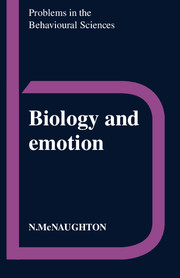Book contents
- Frontmatter
- Contents
- Preface
- Acknowledgements
- 1 Emotion since Darwin
- 2 Releasers and state-dependent reflexes
- 3 Purpose and emotion
- 4 Expression: a window on the emotions?
- 5 Are physiological changes epiphenomena of emotion?
- 6 Somatic influences on the emotions
- 7 Optimal foraging and the partial reinforcement effect: a model for the teleonomy of feelings?
- 8 Do emotions mature or differentiate?
- 9 Cognition, learning and emotion
- 10 Interaction of the components of emotion
- 11 Of mice and men
- 12 Biology and emotion: some conclusions
- Glossary
- Notes
- References
- Index
9 - Cognition, learning and emotion
Published online by Cambridge University Press: 05 August 2012
- Frontmatter
- Contents
- Preface
- Acknowledgements
- 1 Emotion since Darwin
- 2 Releasers and state-dependent reflexes
- 3 Purpose and emotion
- 4 Expression: a window on the emotions?
- 5 Are physiological changes epiphenomena of emotion?
- 6 Somatic influences on the emotions
- 7 Optimal foraging and the partial reinforcement effect: a model for the teleonomy of feelings?
- 8 Do emotions mature or differentiate?
- 9 Cognition, learning and emotion
- 10 Interaction of the components of emotion
- 11 Of mice and men
- 12 Biology and emotion: some conclusions
- Glossary
- Notes
- References
- Index
Summary
Pluralitas non est ponenda sine necessitate.
Propose plentiful parameters only when pushed.
Gulielmus de Occam: Quodlibeta, V, Q.iWhat place has learning in the analysis of emotion?
In the initial parts of this book the internal and external expressions of emotions were treated as if they are fixed both in form and in terms of adequate releasing stimuli. However, the previous chapter shows that the exact form of adult emotional reactions depends on early experience – and hence in some sense on learning. Learning is also a critical factor in determining adequate stimuli for many organisms. It will be remembered from Chapter 2 that the adequacy of a stimulus for the release of a state-dependent reflex depended on the interpretation of the stimulus by the animal rather than any gross aspect of the physical characteristics of the stimulus complex.
In this context the study of animal learning is important for two different reasons. First, it gives us a way of studying scientifically (and hence in the terms of the present book biologically) the modifiable aspects of the control of emotional behaviour, which are not amenable to comparative analysis because they differ from individual to individual even within the same species. Second, it provides us with a means of assessing the internal states and processes which give rise to emotional behaviour and the nature of the adequate stimuli which give rise to those states. In this sense learning theory can provide us with an assessment of cognitive factors in animals.
- Type
- Chapter
- Information
- Biology and Emotion , pp. 105 - 129Publisher: Cambridge University PressPrint publication year: 1989



